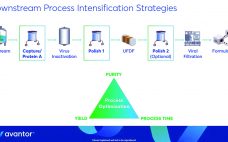Presented by: Anil Sebastian, group leader, cell culture development; and Joachim Klein, head of microbial strain development and cell banking, Lonza Pharma & Biotech Although monoclonal antibodies (MAbs) remain the most popular modality in the biopharmaceutical industry, new molecular formats (NMFs) such as multitoxin antibody–drug conjugates and multichain antibodies are gaining ground quickly. Such molecules are imposing new demands on gene-expression technologies. Sebastian and Klein described how their company’s solutions support upstream development for therapies based on NMFs. Sebastian highlighted…
Sponsored Content
Key Challenges and Potential Solutions for Eliminating Bottlenecks and Optimizing Downstream Operations
Presented by: Willie Hesselink, technical application project manager, biopharmaceutical production, Europe, Avantor Investments in cell-culture technologies have increased monoclonal antibody (MAb) yields significantly over the past two decades. Downstream operations continue to lag in productivity, however. Hesselink explored how companies can align downstream productivity with upstream yields to mitigate production bottlenecks. He focused on intensifying chromatography steps, optimizing buffer preparation, and mitigating variations across raw materials. Chromatography resin selection is vital to downstream intensification, Hesselink explained. Capture and polishing steps…
A Behind-The-Scenes Look at Lykan Bioscience’s State-of-the-Art, Purpose-Built Cell Therapy Facility
Presented by: Patrick Lucy, president and chief executive officer, Lykan Bioscience Lykan Bioscience is a cell-therapy–focused contract development manufacturing organization (CDMO) based in Hopkinton, MA. Lucy’s presentation showcased his company’s new purpose-built manufacturing facility and described how its design can help to expedite manufacturing of cell therapy products. Emphasizing the highly individualized nature of autologous therapy production, Lucy also explained how the Lykan team integrates its logistical and manufacturing operations to maximize patient access to lifesaving treatments. Lykan’s 64,000-ft2 facility…
Comprehensive Target Discovery and Validation at HDB–WuXi AppTec
Presented by: Shelly (Fang) Zhang, director II, exploration biology team leader, HD Biosciences–WuXi AppTec Novel target discovery and validation are the most crucial steps in successful drug development. Zhang presented her company’s evolving advanced gene manipulation (AGM) program, which is propelled by application of clustered regularly interspaced short palindromic repeats (CRISPR) and CRISPR-associated protein_9 (Cas9) technologies. The AGM platform supports target discovery and validation for conventional biologics and new modalities. She highlighted a number of technologies in development and their…
TESSA Platform Delivers High-Quality, High-Titer, Multiserotype rAAV Stocks
Presented by: Maria PatrĂcio, lead scientist for viral design and discovery, Oxgene, a WuXi Advanced Therapies company Building upon colleague Jason King’s BPI Theater presentation on transient transfection platforms for viral-vector production, PatrĂcio focused on scalable manufacturing solutions for adenoassociated virus (AAV), the vector used most often to deliver gene therapies. AAV naturally requires a helper virus to replicate. Plasmid transfection enables helper-free manufacture, but that process is difficult to manage at commercial scales. A more scalable approach is to…
Applying the Allogeneic Process to Overcome Challenges in Cell Therapy
Presented by: Evan Zynda, staff scientist, Thermo Fisher Scientific Cell therapy companies increasingly are pursuing allogeneic therapies to negotiate manufacturing challenges associated with autologous approaches. Products based on high-quality cells from healthy donors could improve therapeutic efficacy. Allogeneic approaches also could facilitate large-scale therapy production, which in turn could reduce time-to-treatment and increase therapy affordability and accessibility. Zynda showed how increased understanding of T-cell biology could help improve allogeneic workflows. Zynda emphasized the utility of studying signaling pathways associated with…
Transient Viral Vector Solution
Presented by: Jason King, business development manager, Oxgene, a WuXi Advanced Therapies company Since joining the WuXi Advanced Therapies division of WuXi AppTec in March 2021, Oxgene has focused on helping gene therapy developers to optimize their viralvector production systems as they transition from preclinical and early clinical projects to good manufacturing practice (GMP)-grade manufacturing. King observed that early stages of gene therapy development nearly always involve systems for transient transfection rather than scalable platforms. Inducible producer cell lines, viral…
Enabling Pharma and Biotech Innovation Through an Open-Access Platform: Targeted Protein Degradation
Presented by: Dave Madge, vice president, research division, WuXi AppTec Madge described methods that his company applies to identify and evaluate bifunctional molecules that mediate targeted protein degradation (TPD). He pointed out that although much TPD research focuses on proteolysis targeting chimera (PROTAC) compounds, the tools used to identify such molecules also can be used to evaluate the therapeutic potential of other bifunctional molecules. Of particular interest are those that bring “housekeeping proteins” to disease-causing targets. More broadly, researchers are…
BioProcess Insider Interview: Sam Machour, Samsung Biologics
BioProcess Insider brings the biotechnology news as it breaks. For the on-demand BPI Theater at the Biotechnology Innovation Organization’s 2021 convention, founding editor Dan Stanton interviewed leading biopharmaceutical executives in early June 2021. Contract development and manufacturing organizations (CDMOs) have thrived during the COVID-19 pandemic despite constraints on supply chains. Sam Machour, senior vice president and chief quality officer at Samsung Biologics explained that his company’s pandemic-period success has stemmed primarily from its ability to accelerate production timelines. Before 2020,…
Media Management: A Critical Consideration Before Intensification
Process intensification (PI) enables faster drug development and increased productivity, flexibility, and quality. But PI can also introduce the challenge of increased media volumes and how to manage them in upstream processes. This whitepaper provides the tools and information needed to consider PI options while evaluating the implications of media management. Follow the media journey from prep to use, exploring potential logistical pitfalls in managing increased media volumes associated with process intensification. Finally, see how the right equipment and platforms…










